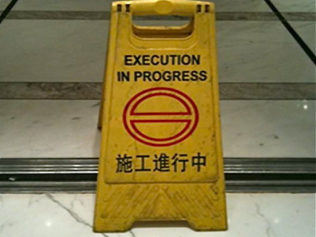Is there a translator in the house?
Translators are required to make hundreds of judgments every day. Some of these are analytical judgments, which call on the translator to come to conclusions based on limited evidence. That means answering questions like this:
- what is the author trying to get across?
- what does this term mean in this particular context?
- does this adjective modify the whole noun phrase or just the noun in that phrase that is closest to it?
- what is the implied agent in this passive construction?
Other judgments are prescriptive, which is to say that they concern the conventions of the target language, and include questions like:
- what is the best term to express this concept in this context?
- what tense should this be written in? (when there are tenses that exist in the source language but not the target language or vice-versa)
- should I use plural markers, singular markers, or no number markers at all? (again, not all languages have the same options)
These sorts of questions are of particular importance in cases where the wording of the translation is likely to be scrutinized. Legal translations are an obvious example, but translators of poetry or advertising copy may spend even more time struggling with these decisions.
Most of the time, the answers are obvious or can be determined with a bit of research but there also exist cases of genuine ambiguity in the source language or lack of consensus in the target language. In such cases it may almost seem that there is nothing for it but to flip a coin, but a professional translator is obviously obliged to come to a reasoned decision.
This situation is, in fact, analogous to that faced by doctors on a regular basis. Just as a translator may encounter a sentence that they cannot understand, even after consulting all of their dictionaries and the Oracle of Delphi Google, a doctor may encounter a patient with symptoms that are not clearly indicative of any one particular illness, even after various diagnostic tests. Or, just as a translator may understand a phrase but be unsure of the best way to render in the target language, a doctor may know exactly what is wrong with a patient but hesitate when it comes to the best treatment.
In such situations the doctor will seek a second opinion, and the translator’s best course of action is to do exactly the same. At Patent Translations Inc. we are fortunate enough to work in teams, so there is always a native speaker, or a technical specialist, or a legal expert to consult. It is not uncommon for us to have three or four people discussing one particular term or phrase. But many freelance translators do not have this support. Fortunately, it is possible for freelancers to build their own support network.
There are many places where translators routinely support each other in this way, such as the Honyaku list for J-E translations, the Japanese Patent Translation List and the Patent Translators list, which is for all languages, but tends to deal with a lot of German. Proz is also a good place to ask questions and get answers. Keep in mind that, whichever forum you use, your question is likely to get the most attention if you have a reputation for answering other people’s questions.
It is also possible to go to non-translators for an opinion, but just as the doctor will be reluctant to ask the advice of a non-doctor, there is good reason to seek the advice of another translator first. The trouble with muggles is that they are likely to tell you that it doesn’t matter which word you choose (engineers are particularly guilty of linguistic indifference) or to suggest a radically different phrasing, or even a different technical solution to the one described. In short, they rarely “get” what the job of a translator is.
One last source of counsel, which should not be overlooked, is the person or company ordering the translation, particularly if this is a translation agency.
Wherever you turn for your second opinion, remember that asking is a sign of strength, not weakness, and that small-group consensus is the mainstay of almost every profession that relies on judgment.





